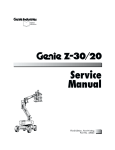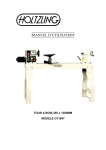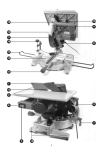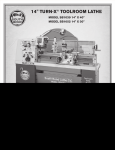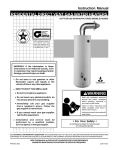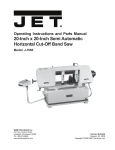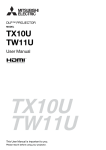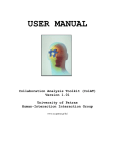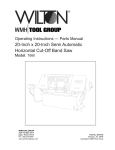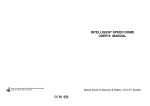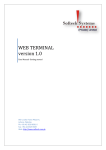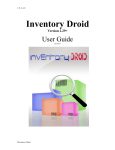Download CX700 10” x 22” METAL LATHE with DIGITAL
Transcript
CX700 10” x 22” METAL LATHE with DIGITAL READOUT User Manual TABLE OF CONTENTS General Safety Instructions................................................................................................. 3 Specific Safety Instructions ................................................................................................. 4 Features .............................................................................................................................. 5 Physical Features................................................................................................................ 6 Set-Up ................................................................................................................................. 7 Un-Packing & Inventory ...................................................................................................... 7 Proper Grounding................................................................................................................ 8 Chuck .................................................................................................................................. 9 Steady Rest......................................................................................................................... 9 Follow Rest ......................................................................................................................... 10 Lathe Bed............................................................................................................................ 10 Headstock ........................................................................................................................... 10 Gearbox .............................................................................................................................. 11 Headstock Controls............................................................................................................. 11 Apron................................................................................................................................... 12 Saddle ................................................................................................................................. 12 Carriage Controls ................................................................................................................ 12 Lead Screw ......................................................................................................................... 13 Tailstock .............................................................................................................................. 14 Tailstock Controls................................................................................................................ 14 Test Run.............................................................................................................................. 15 Speed Change .................................................................................................................... 16 Longitudinal Turning with Auto-Feed .................................................................................. 17 Manual Longitudinal Turning............................................................................................... 17 Facing and Recesses.......................................................................................................... 17 Turning Between Centers ................................................................................................... 18 Thread Cutting .................................................................................................................... 18 Change Gears Replacement............................................................................................... 19 Gibs Adjustment.................................................................................................................. 19 Chuck Run-Out ................................................................................................................... 20 Headstock and Tailstock Alignment .................................................................................... 21 Main Spindle Bearings ........................................................................................................ 22 Lubrication........................................................................................................................... 22 Maintenance........................................................................................................................ 24 Optional Stand .................................................................................................................... 25 Troubleshooting .................................................................................................................. 26 Parts Diagram and Parts List ....................................................................................... 27 –48 Warranty....................................................................................................................... .......49 2 GENERAL SAFETY INSTRUCTIONS FOR MACHINES Extreme caution should be used when operating all power tools. Know your power tool, be familiar with its operation, read through the user manual and practice safe usage procedures at all times. ALWAYS read and understand the user manual before operating the machine. CONNECT your machine ONLY to the matched and specific power source. ALWAYS wear safety glasses respirators, hearing protection and safety shoes, when operating your machine. DO NOT wear loose clothing or jewelry when operating your machine. A SAFE ENVIRONMENT is important. Keep the area free of dust, dirt and other debris in the immediate vicinity of your machine. BE ALERT! DO NOT use prescription or other drugs that may affect your ability or judgment to safely operate your machine. DISCONNECT the power source when changing drill bits, hollow chisels, router bits, shaper heads, blades, knives or making other adjustments or repairs. NEVER leave a tool unattended while it is in operation. NEVER reach over the machine when the tool is in operation. ALWAYS keep blades, knives and bits sharpened and properly aligned. ALL OPERATIONS MUST BE performed with the guards in place to ensure safety. ALWAYS use push sticks and feather boards to safely feed your work through the machine and clamp the work-piece (when necessary) to prevent the workpiece from any unexpected movement. ALWAYS make sure that any tools used for adjustments are removed before operating the machine. ALWAYS keep the bystanders safely away while the machine is in operation. NEVER attempt to remove jammed cutoff pieces until the saw blade has come to a full stop. 3 CX700 - METAL LATHE SPECIFIC SAFETY INSTRUCTIONS broken parts, and any other conditions that may effect the tools operation. This machine is designed and intended for use by properly trained and experienced personnel only. If you are not familiar with the proper use of lathes, do not use this machine until proper training and knowledge has been obtained. Remove adjusting keys and wrenches. Remove all the tools used for adjustment before turning the machine on. Keep guards in place. Safety guards must be kept in place and in working order all the times to ensure safety. Be careful. Do not put your hand close to the cutter while the machine is running. Keep children and visitors away. All children and visitors should be kept at a safe distance from the work area. Never leave the lathe unattended while it is running. Wear proper apparel. Loose clothing, gloves, neckties, rings, bracelets, or other jewelry may get caught in moving parts. Non-slip footwear is recommended. Wear protective hair covering to contain long hair. Do not wear any type of gloves. Do not over-reach. Keep proper footing and balance at all times. Maintain tools with care. Keep tools sharp and clean for best and safest performance. Follow instructions given in the manual for lubrication and replacing accessories. Always use safety glasses. For the safety of your eyes, safety glasses should be used while operating the lathe. Turn the power OFF. Before making any adjustments, make sure the switch is in the “OFF” position and the cord is un-plugged from the power outlet. Do not use the lathe in dangerous environments. Do no expose the machine to rain. Do not use the machine in wet locations. Make sure you have read and understood all the safety instructions in the manual and you are familiar with your metal lathe, before operating it. If you fail to do so, serious injury could occur. Check for damaged parts. Check for proper alignment of moving parts, WARNING The safety instructions given above can not be complete because the environment in every shop is different. Always consider safety first as it applies to your individual working conditions. 4 CX700 – METAL LATHE FEATURES MODEL CX700 – 10” x 22” METAL LATHE WITH VARIABLE SPEED As part of the growing line of Craftex metalworking equipment, we are proud to offer the CX700 a 10” x 28” Metal Lathe with Digital Readout. The Craftex name guarantees Craft Excellence. By following the instructions and procedures laid out in this user manual, you will receive years of excellent service and satisfaction. The CX700 is a professional tool and like all power tools, proper care and safety procedures should be adhered to. Motor....................................................1-HP, 0.75 KW, DC90 V, 8-Amps Swing Over Bed ...................................10” (250mm) Swing Over Cross Slide .......................5-1/2” (140mm) Distance Between Centers ..................21-3/4” (550mm) Width of Bed ........................................5-5/16” (135mm) Hole Through Spindle ..........................7/8” (21mm) Spindle Nose Taper .............................MT3 Number of Spindle Speeds ..................Variable Range of Spindle Speeds ....................A = 100 – 1100 RPM, B=200 – 2200 RPM Number of Metric Threads ...................15 Range of Metric Threads .....................0.35mm – 3.5mm Number of Imperial Threads ................27 Range of Imperial Threads ..................8 – 56 T.P.I Tool Post Type .....................................4-Way Max Compound Slide Travel................3” (80mm) Max Cross Slide Travel ........................4” (100mm) Maximum Carriage Travel....................22” (550mm) Tailstock Spindle Travel .......................2-1/2” (65mm) Taper in Tailstock Spindle....................MT2 Overall Dimension of the lathe .............Length 47” x Width 26” x Height 22” Weight..................................................165 Kgs (364 lbs) Warranty ..............................................3-Years 5 CX700 - METAL LATHE PHYSICAL FEATURES A. Variable Speed Switch N. Lead Screw B. Spindle RPM Digital Readout O. Chip Tray C. Headstock P. Thread Dial Indicator D. ON/OFF, Emergency Switch Q. Half Nut Lever E. Forward/Reverse Switch R. Feed Selector Lever F. 3-Jaw Chuck S. Carriage Hand Wheel G. Four Way Tool Post T. Cross Slide Hand Wheel H. Tail Stock Quill Lock Lever U. Gearbox Oil Fill Plug I. Tail Stock V. Feed/Thread Selector Knob J. Tailstock Lock Lever W. Oil Sight Glass K. Tail Stock Hand Wheel X. Feed Rate Selector Knob L. Tailstock Adjustment Screw Y. Threading/Feeding Table M. Lathe Bed Z. Feed Direction Lever 6 SETUP Before setting up your machine you should read and understand the instructions given in this manual. The unpainted surfaces of this lathe are coated with a rust preventive waxy oil and you will want to remove this before starting assembly. Use a solvent cleaner that will not damage painted surfaces. WARNING CX700 is a very heavy machine, do not over-exert yourself. Use fork truck or other mechanical devices for safe moving method LIST OF CONTENTS A. B. C. D. E. F. G. H. I. J. K. L. M. N. O. P. QTY Face Plate........................................ 1 Change Gears ................................ 17 4-Jaw Chuck .................................... 1 3-Jaw Chuck .................................... 1 Steady Rest ..................................... 1 Follow Rest ...................................... 1 External Jaws for 3-Jaw Chuck........ 3 Dead Center MT3, MT2 ................... 2 Oil Gun............................................. 1 Toolbox ............................................ 1 4-Way Tool Post .............................. 1 Wrenches (8-10, 12-14) ................... 2 Hex Wrenches (2, 3, 4, 5, 6) ............ 5 Chuck Keys...................................... 1 Screw Drivers (Flat & Cross Head) .. 2 Lathe (Not Shown) ........................... 1 When setting up your machine, you will want to find an ideal spot where your metal lathe will most likely be positioned most of the time. Figure-1 CX700 Foot print UNPACKING To ensure safe transportation this machine is properly packaged and shipped completely in crates. When unpacking, carefully inspect the crates and ensure that nothing has been damaged during transit. Open the crates and check that the machine and the parts are in good condition. Figure-2 Inventory While doing inventory, if you can not find any part, check if the part is already installed on the machine. Some of the parts come assembled with the machine because of shipping purposes. 7 PROPER GROUNDING Grounding provides a path of least resistance for electric current to reduce the risk of electric shock. CX700 is equipped with a DC 90-V single phase motor. To prevent electrical hazards, have a qualified electrician ensure that the line is properly wired. This lathe is for use on a normal 110 volt circuit. Make sure that the appliance is connected to an outlet having the same configuration as the plug. If an adaptor plug is used, it must be attached to the metal screw of the receptacle. WARNING Improper connection of the equipmentgrounding conductor can result in a risk of electric shock. Check with a qualified electrician if you are in doubt as to whether the outlet is properly grounded. It is strongly recommended not to use extension cords with your CX700. Always try to position your machine close to the power source so that you do not need to use extension cords. Incase if you really find it necessary to use an extension cord, make sure the extension cord does not exceed 50-feet in length and the cord is 12-gauge to prevent motor damage. Your CX700 should be wired with a plug having 3-prongs to fit a 3 prong grounding receptacle as shown in figure-3. Do not remove the grounding prong to fit it into a 2-pronged outlet. Always check with a qualified electrician if you are in doubt. Figure-3 110-Volts Outlet for CX700 8 CHUCK CX700 comes equiped with a 125mm, 3jaw chuck, a 125mm, 4-jaw chuck and a 220mm faceplate. Secure the steady rest to the lathe bed from below with a locking plate. A single cap screw, along with a nut and washer hold the steady rest in place as shown in figure-5. The 3-jaw chuck is a scroll type chuck, meaning that all three jaws move in union when adjusted while the 4-jaw chuck features four independent jaws. The 4-jaw chuck is used to clamp square or unevenlyshaped work-pieces. The chucks feature three hex nut and three set screws for mounting as shown in figure4. Figure-5 Steady rest TO SET-UP THE STEADY REST: Figure-4 Chuck mounting screws and nuts When removing the chuck, loosen the hex nuts, turn the washer counter-clockwise and pull out the chuck. See figure-4. STEADY REST The steady rest supports long, small diameter stock that otherwise could not be turned. The steady rest can also replace the tailstock to allow for cutting tool acces at the outboard end of your work-piece. Make sure the switch is in the OFF position and the cord is disconnected from the power source. Loosen the hex nuts shown in figure-5. Loosen knurled screw and open the sliding fingers until the steady rest can be moved with its finger around the work-piece. Secure the steady rest in position. See figure-5. Tighten the knurled screw so that the fingers are snug but not tight against the work-piece. Tighten three nuts shown in figure-5 and lubricate the sliding points with machine oil. To mount the steady rest: 9 The sliding fingers of the steady rest shown in figure-5 should receive periodic lubrication when used, to prevent premature wear. FOLLOW REST rigidity. It integrates the headstock and drive unit, for attaching the carriage and leads crews. The two precision ground Vsideways are re-enforced by heat hardening and grinding to guide the carriage and the tailstock accurately. The main motor is mounted to the rear of the left side of the bed. The follow rest is mounted on the saddle with two cap screws shown in figure-6 and it follows the movement of the turning tool. Only two sliding fingers are required. The place of the third finger is taken by turning tool. The follow rest is used for turning operations on long slender work-pieces. It prevents flexing of the work-piece under pressure from the turning tool. Set the fingers snug to the work-piece and make sure not to over tighten. Lubricate the fingers during operation to prevent premature wear. Figure-7 Lathe bed HEADSTOCK Made from high quality, cast iron for low vibration, the headstock is bolted to the bed with four screws. The headstock houses the main spindle with two precision taper roller bearings and the drive unit. The main spindle transmits the torque during the turning process and it also holds the work-piece and clamping devices. Figure-6 Follow rest installed LATHE BED The lathe bed is made of high quality iron. The lathe bed features high cheeks with strong cross ribs ensuring low vibration and Figure-8 Headstock 10 GEARBOX The gearbox is located on the left side of the lathe and is mounted on the bed. It is used to select the feeds for straight turning as well as for thread cutting. In order to achieve certain thread pitches, it is necessary to replace the change gears. The torque of the work spindle is transmitted to the feed gears and thus to the lead screw. Figure-9 Gearbox HEADSTOCK CONTROLS EMERGENCY ON/OFF BUTTON: The On/Off button allows to start and stop the machine. FORWARD / REVERSE SWITCH: After the machine is switched ON, turn the switch to “F” position for counter-clockwise spindle rotation (forward). Turn the switch to “R” position for clockwise spindle rotation (Reverse). Turning the switch to “0” position the spindle remains idle. Figure-11 Forward / Reverse switch FEED RATE SELECTOR KNOB: Use the feed rate selector knob to set the desired feed or thread rates. See figure-12. FEED THREAD SELECTOR KNOB: For thread selecting, shift the knob to the left and for feed selecting, shift the knob to the right. See figure-12. FEED DIRECTION LEVER: Pull the knob on the feed direction lever to disengage and position the lever up or down to change the rotating direction of the carriage Release the nut to lock the lever in position. Putting the lever in the top position, moves the carriage to the left along the bed and Figure-10 ON/OFF switch 11 moves the top slide towards the work-piece, while the spindle is turning counterclockwise. Putting the lever in the bottom position, moves the carriage to the right along the bed and moves the top slide away from the work-piece, while the spindle is turning counter-clockwise. SADDLE The saddle is made from high quality cast iron and all sliding parts are smoothly ground to fit the V on the bed without play. Putting the lever in the middle position, disengages the gears and the feed screw does not turn, while the spindle is turning counter-clockwise. VARIABLE SPEED CONTROL KNOB: Turn the knob clockwise to increase the spindle speed and counter-clockwise to decrease the spindle speed. The possible speed range is dependent on the position of the drive belt. See figure-12. Figure-13 Saddle and apron CARRIAGE CONTROLS The carriage allows the cutting tool to move along the length of the lathe bed .The cross slide allows the cutting tool to travel perpendicular to the bed. The carriage features a top slide which allows linear movement of the cutting tool at any preset angle .This section will review the individual controls on the carriage and provide descriptions of their uses. Figure-12 Headstock controls APRON The apron is mounted to the saddle and to the front side of the bed and it houses the half nut with an engaging lever for activating the automatic feed. The half nut gibs can be adjusted from the outside. LONGITUDINAL TRAVEL HAND WHEEL: Turning the longitudinal hand wheel, moves the carriage left or right along the bed .The control is helpful when setting up the machine for turning, when manual movement is desired during turning operations. See figure-14. CROSS SLIDE HAND WHEEL: Turning the cross slide hand wheel, moves the cross slide towards or away from the workpiece. The graduated scale can be adjusted 12 using the same method as the longitudinal scale. See figure-14. TOP SLIDE HAND WHEEL: The top slide hand wheel controls the position of the cutting tool relative to the work-piece .The top slide is adjustable for angle as well as longitudinal travel. It can be adjusted a full 360°, if needed. The graduated scale is adjustable using the same method as the other hand wheels. See figure-14. HALF NUT LEVER: This lever engages and disengages the half nut on the lead screw. The lever is only engaged while turning threads in stock. A lockout device feature in the lever mechanism engages when the feed selector is used. THREADING DIAL INDICATOR: This indicator tells you when to engage the half nut for threading process. See figure-15. TOOL POST: A four-way tool post is supplied with the CX700. Cutting tools can be attached and removed by tightening or loosening the clamping bolt. See figure-14. Figure-15 Carriage controls LEAD SCREW Figure-14 Carriage controls FEED SELECTOR LEVER: Moving this lever upward engages the automation longitudinal feed. Moving this lever down engages the automation transverse feed. See figure-15. The lead screw is mounted on the front of the machine bed. It is connected to the gear box at the left for automatic feed and is supported by bearing on both ends. WARNING DO NOT simultaneously engage the feed selector lever and the half nut lever. Doing so will damage the lathe. Figure-16 Lead screw 13 TAILSTOCK TAILSTOCK CONTROLS The tailstock slides on a V-way and can be clamped at any location. The tailstock has a heavy duty spindle and the spindle can be clamped at any location with a clamping lever. The spindle is moved with a hand wheel at the end of the tailstock. TAILSTOCK HAND WHEEL: Turning the hand wheel advances or retracts the quill in the tailstock. The graduated scale on the hand wheel is adjustable. See figure-19. QUILL LOCK LEVER: This lock lever locks the quill in position when tightened. See figure-19. TAILSTOCK LOCK LEVER: Turn this lock lever up to lock and down to unlock the tailstock in position on the lathe bed. See figure-19. ADJUSTMENT SCREW: This set screw is used to align the tailstock with the headstock. See page-21 for details on center alignment. Figure-17 Tailstock Make sure to install the securing screw at the end of the lathe as shown in figure-10 in order to prevent the tailstock from falling off the lathe bed. Figure-19 Tailstock controls Figure-18 Installing the securing screw on the lathe bed 14 TEST RUN While test running the machine, check the following: Once you have assembled your lathe completely, it is then time for a test run to make sure that the lathe works properly and is ready for operation. The Emergency Stop & ON/OFF buttons are working properly. Remove all the tools used for assembling the machine and make sure all the guards are in place. WARNING Before starting the lathe, make sure that you have read and understood the manual and you are familiar with the functions and safety features on this machine. Failure to do so may cause serious personal injury. To ensure the carriage controls do not move unexpectedly when the lathe is started, rotate the feed direction selector knob so that the arrow is pointing to the middle (neutral) position. See figure-20. The chuck and jaws are properly secured and working properly. While the machine is running, turn the variable speed control knob clockwise to make sure it is working properly. Let the machine run for 10 minutes at the Low Speed. During the test run if there is any unusual noise coming from the lathe or it vibrates excessively, turn OFF the power switch immediately and disconnect from the power source Investigate if you can find out the problem with your machine. See page-26 for troubleshooting. If the machine is running smoothly, proceed to the next step. Change the belt for High Speed and let the machine run for another 10 minutes. See page-16 for details on speed change. Turn the machine OFF and turn the Forward/Reverse switch to “R” position. Turn the machine back ON and make sure the spindle is rotating clockwise (reverse). WARNING Figure-20 Feed direction selector knob Do not make any adjustments while the machine is running. Failure to follow this warning can cause serious personal injuries to the operator and damage to the machine. Connect the cord to the power outlet and turn the machine ON. 15 SPEED CHANGE The rotating speed of the headstock is controlled by the positioning of the belts on the pulleys. These are accessed by removing the cover on the end of the headstock. Refer to the plate on the headstock to determine which belt combinations produce what speeds. The speed settings available on the machine are 100 – 1100 RPM and 200 - 2200 RPM. TO CHANGE THE SPINDLE SPEED: Unscrew the two fastening knobs shown in figure-21 and remove the protective cover. Figure-21 Removing the cover Loosen the four nuts and screws shown in figure-22 and move the motor mounting pulley to release the tension on the belt. Once the belt tension is released, reposition the belt on the pulleys grooves for high or low spindle speed. Figure-22 Screws and nuts securing the motor mounting plate Position the belt on the pulleys for high and low speed according to figure-23. The low spindle speed is 100 – 1100 RPM while the high spindle speed is 200 – 2200 RPM. Figure-23 Belt position on the pulleys Once the belt is on the right grooves, move the motor pulley back to its position to tension the belt. Re-tighten the screws and nuts removed and re-install the protective cover. IMPORTANT We suggest selecting the low speed. It provides stronger torque while operation. 16 LONGITUDINAL TURNING WITH AUTO-FEED MANUAL LONGITUDINAL TURNING Set the feed direction lever and feed rate selector knob shown in figure-24 to select the feed direction and feed speed. In this turning operation, the tool feeds parallel to the axis of rotation (longitudinal) of the work-piece. Manual feed is accomplished by turning the carriage hand wheel on the lathe apron or the top slide. The cross feed for the depth of cut is achieved using the cross slide. See figure26. Figure-24 Feed rate selector knob, feed direction lever and chart Figure-26 Straight turning FACING AND RECESSES Use the chart on the lath for selecting the feed speed or the thread pitch. Select the proper gear set if the required feed or thread pitch can not be obtained with the installed gear set. Automatic feed is accomplished by moving the auto feed selector lever, up. See figure-25. Figure-25 Auto feed selector lever In the facing operation, the tool feeds perpendicular to the axis of rotation of the work-piece. The feed is made manually with the cross slide hand wheel. The depth of cut is made with the top slide. See figure27. Figure-27 Facing & dressing 17 TURNING BETWEEN CENTERS For turning between centers, it is necessary to remove the chuck from the spindle. Fit the MT2 center into the reducing sleeve (not provided) and fit the reducing sleeve into the spindle taper. If you are using the MT3 center (provided), you can simply fit the center into the spindle taper. Mount the work-piece fitted with the driver dog between the centers. The driver is driven by a catch or face plate. See figure28. IMPERIAL THREAD: When cutting inch threads, the half nut and threading dial are used to thread in a conventional manner. The threading and feeding chart on the headstock specifies at which point a thread can be entered using the threading dial. METRIC THREAD: The only difference in metric thread cutting is that the half nut must remain engaged during the entire threading process. The thread dial can not be utilized. Figure-29 Half nut and threading dial Figure-28 Turning between centers Set the machine up for the desired thread pitch. IMPORTANT Start the machine and engage the half nut. When the tool reaches the end of the cut, stop the machine by turning the motor off and at the same time back the tool out off the work-piece so that it clears the thread. Always use a small amount of grease on the tailstock center to prevent center tip from over heating. Do not disengage the half nut lever. THREAD CUTTING Several different threads can be cut using the proper combination of gears and settings. Reverse the motor direction allowing the cutting tool to traverse back to the starting point. Repeat these steps until you have obtained results. 18 LEFT AND RIGHT THREAD CUTTING: The left and right thread cutting is done using the feed direction selector knob. Turning the feed direction selector knob counter-clockwise, cuts left thread while turning it clockwise, cuts right thread. Select the proper gear set according to your requirements from the chart given on the head stock and install it onto the quadrant using nuts removed. Re-install the protective cover. . IMPORTANT We suggest selecting the low speed. It provides stronger torque while operation. CHANGE GEARS REPLACEMENT To replace the change gears: Make sure the switch is in the OFF position and the cord is unplugged from the power outlet. Unscrew the two fastening knobs and remove the protective cover to access the change gears. Unscrew the bolt from the lead screw and the square bolts shown in figure-30 from the quadrant bolts in order to remove the change gears. Figure-30 Change gears replacement GIBS ADJUSTMENT There are two main gib screws adjustment for the machine; the cross slide gib screws and the top slide gib screws. WARNING Make sure the switch is in the OFF position and the cord is disconnected from the power source before making any adjustments. Failure to do so can result serious personal injury. CROSS SLIDE GIB SCREWS ADJUSTMENT The adjustment gibs are located on the left side of the cross slide. To adjust gib, loosen the nuts holding the gibs. Tighten the gibs until excess movement is eliminated and retighten the nuts. See figure-31. Figure-31 screws Cross slide adjustment gib 19 TOP SLIDE GIBS ADJUSTMENT Locate the adjustment gibs on the side of the top slide as shown in figure-32. Loosen the nuts holding the gibs and then tighten the gibs until excess movement is eliminated. Once all the gibs are tightened properly, retighten the nuts. Figure-32 Top slide adjustment gibs screws CHUCK RUN-OUT If your lathe requires a higher level of accuracy, you may find it necessary to trueup the chuck to ensure minimal run-out. To check and correct the chuck run-out: Mount a piece of bar stock in the chuck. The stock should protrude approximately 50mm. Remove the bolts, securing the back plate to the chuck. Tap along the edge of the mounting shoulder until the chuck and back plate are free of each other and thread back plate onto the spindle. Remove about 0.12mm of material from the surface that the chuck mounts to. Be careful not to remove any material from the diameter of the shoulder. See figure-33. Figure-33 Turning the back plate Install the chuck onto the back plate and check the run-out. If the run-out is not within an acceptable range, it may be necessary to turn a new shoulder on the back plate. Before turning a new shoulder, measure the diameter of the recess in the back of the chuck accurately. Remove approximately one half of the thickness of the shoulder (approximately 1.5mm). Remove the same thickness off the face of the mounting surface. Use a dial indicator and measure the runout at the end of the bar. In most cases, the amount of run-out will not exceed 0.12mm over 50mm which should be accurate enough for most applications. If the run-out on the chuck is excessive (e.g. greater than 0.15mm), the excess run-out should be eliminated. Start by removing the chuck. Figure-34 Turning new shoulder on back 20 The finished diameter of the shoulder should be 0.025mm larger than the diameter of the recess in the chuck. This is a critical step in minimizing chuck run-out. Re-install the chuck and check for run-out. HEADSTOCK & TAILSTOCK ALIGNMENT The headstock and tailstock alignment has been adjusted properly in the factory before the machine is shipped to you. However, after lengthy operation, the headstock and tailstock may be out of alignment. To check the centers alignment: Figure-36 Stock thicker at the tailstock end If the stock is thinner at the tailstock end, the tailstock needs to be moved away from you to the amount of taper. See figure-37. Center drill a 150mm piece of bar stock on one end and position it between the headstock and tailstock as shown in figure35. Figure-37 Stock thinner at the tailstock end Figure-35 checking headstock and tailstock alignment Turn approximately 0.025mm off diameter. Measure the stock with a micrometer. If the stock is thicker at the tailstock end, the tailstock needs to be moved towards you to the amount of taper. See figure-36. TO MOVE THE TAILSTOCK: Make sure the switch is in the OFF position and the cord is disconnected from the power outlet. Adjust the tailstock offset to the amount by turning the adjustment screw shown in figure-38. 21 Re-tighten the two hex socket cap screws. CAUTION Make sure not to tighten the hex socket cap screws excessively or it will damage the bearing. Figure-38 Tailstock offset adjustment screw Turn another 0.5mm off the stock and check for taper. Repeat this procedure until the tailstock is aligned with the headstock. LUBRICATION Lubricate all slide-ways lightly before every use. WARNING MAIN SPINDLE BEARINGS The main spindle bearings are adjusted at the factory. If end play becomes evident after considerable use, the bearings may be adjusted. Loosen two hex socket cap screws in the slotted nut shown in figure-39. Tighten slotted nut until all end play is taken up. The spindle should still revolve freely. Figure-39 Main spindle bearing adjustment Lathe must be serviced at all lubrication points and all reservoirs filled to operating level, before the lathe is placed into service. Failure to comply may cause serious damage. GEARBOX Oil must be up to the indicator mark in the oil sight glass as shown in figure-45. Fill by pulling plug shown in figure-40. Figure-40 Fill plug location 22 CHANGE GEARS TOP SLIDE Apply a few drops of oil on the gears teeth and avoid getting oil on the pulleys and belt. Lubricate the two oil ports shown in figure43 with 20W machine oil once daily. Figure-41 Gears Figure-43 Top slide oil ports SADDLE Lubricate the four oil ports (A) shown in figure-42 with 20W machine oil once daily. CROSS SLIDE Lubricate two oil ports (B) shown in figure42 with 20W machine oil. LEAD SCREW Lubricate the oil port (C) shown in figure-44 with 20W machine oil once daily. TAILSTOCK Lubricate the two oil ports (D) shown in figure-44 once daily. Figure-42 Oil ports locations Figure-44 Oil ports locations 23 MAINTENANCE During the life of your machine, you will need to practice some regular maintenance to keep your lathe in peak performance condition. 1. Treat the machine with care, keep it clean and grease and lubricate it regularly. Only through good care you can be sure that the working quality of the machine will remain constant. WARNING Do not remove the chips with your bare hands. There is a risk of cut due to sharp-edged chips. Never use flammable solvents or cleaning agents or agents that generate noxious fumes. Protect electrical components such as motors, switches, switch boxes, etc..., against humidity when cleaning. WARNING Make sure the machine is turned off and the cord is disconnected from the power source before servicing and removing/replacing any components on the machine. 5. After the operation every day, eliminate all the chips and clean different parts of the machine tool and apply machine tool oil to prevent from rusting. 6. Make sure your work area is well ventilated. 2. Oil, grease and cleaning agents are pollutants and must not be disposed off through the drains or in normal garbage. Dispose of those agents in accordance with current local environmental regulations. Cleaning rags impregnated with oil, grease and cleaning wool in a suitable closed vessel and disposed of in an environmentally sound way. Do not put them with normal garbage. 7. Good housekeeping practice should be followed on a daily basis keeping your lathe clean and well lubricated. 3. Lubricate all slide ways lightly before every use. The change gears and the lead screw must also be lightly lubricated with lithium based grease. 4. During operation, the chips which fall onto the sliding surface should be cleaned in a timely fashion. Frequent inspections should be made to prevent chips from falling into the position between the carriage and bed way. 24 OPTIONAL STAND The CX700 features an optional stand and a chip tray Model CX700ST which can be bought separately. Figure-46 Mounting the lathe on the stand Figure-45 CX700 Stand inventory LIST OF CONTENTS A. B. C. D. QTY Left Cabinet..................................... 1 Right Cabinet .................................. 1 Connecting Brackets ....................... 2 Mounting Hardware.................... 1 Bag Once both the brackets are properly secured to the cabinets, position the chip tray on the cabinets aligning the holes on the chip tray with the holes on the cabinet. Now, position the lathe on the stand using a fork truck. Align the holes on the machine with the holes on the chip tray and the cabinets. Open the cabinets and insert the bolts and washers (provided with the stand) from the top and tighten the nuts, from inside cabinets. STAND ASSEMBLY Before attaching the brackets to the stands, thread the bolts into the holes to break the paint ensuring smooth threading after. Connect the left and right cabinet by attaching the brackets to the cabinets and securing those using screws and washers provided. Figure-47 Lathe mounted on the stand 25 26 27 28 INDEX DESCRIPTION 1 2 3 4 5 6 7 8 9 10 11 12 13 14 15 16 17 18 BED SCREW CAP M8-1.25 X 16 WASHER FLAT M8 WASHER LOCK M8 SCREW CAP M8-1.25 X 25 SCREW CAP M4-0.7X 12 PIN 5 X 12 PIN 4 X 20 SCREW SET M10-1.50 X 8 LEADSCREW PIN M6-1.0 X 25 SCREW CAP M6-1.0 X 16 BRACKET OIL PORT M6 RACK SHORT RACK LONG NUT CHIP TRAY 20 21 22 23 24 25 26 27 28 CHIP SHIELD WASHER FLAT M6 SCREW CAP M6-1.0 X 8 SCREW M4-0.7 X 10 BRACKET SCREW COVER BRACKET BRACKET BRACKET 29 30 INDEX 1 2 3 4 5 6 7 8 9 10 11 12 13 14 15 16 17 18 19 20 21 22 23 24 25 26 27 28 29 30 31 32 33 34 35 36 37 38 39 40 41 42 DESCRIPTION KEY A4-14 RIVET 2 X 4 PLATE FLANGE SCREW CAP M4-0.7 X 10 GRADUATED DIAL CURSOR HAND WHEEL WASHER FLAT M10 NUT HEX M10 NUT HEX M10 HANDLE SCREW HANDLE PIN M4 X 20 FLANGE GEAR 70T SPACING RING OIL PORT M8 GEAR SHAFT GEAR SHAFT BUSHING SCREW M4-0.7 X 6 SCREW CAP M5-0.8 X 12 WASHER FLAT M5 (BIG) GEAR 30T PIN M3 X 18 SPACING RING BUSHING GEAR KEY C4 X 10 KEY A5 X 30 SHAFT OIL PORT M6 SCREW M6-1.0 X 6 SPRING STEEL BALL M5 PLATE PIN M3 X 12 LOCATING BLOCK SHAFT FORK PIN M3 X 26 43 44 45 46 47 48 49 50 51 52 53 54 55 56 57 58 59 60 61 62 63 64 65 66 68 69 70 71 72 73 74 75 76 77 78 79 80 81 82 83 84 BUSHING PIN M3 X 35 SCREW CAP M4-0.7 X 35 BRACKET HANDLE GEAR SHAFT PIN M5 X 1 HALF NUT SCREW M5-0.8 X 30 NUT HEX M5-0.8 WASHER GIB PLATE SHAFT BUSHING LOCATING BLOCK LOCKING CAM LEVER HANDLE LEVER LEVER HAND NUT HEX M8-1.25 WASHER FLAT GEAR 45T WASHER KEY A3 X 8 SHAFT BRACKET SCREW CAP M6-1.0 X 60 PLATE DIAL SCREW M4-0.7 X 8 SCREW CAP M6-1.0 X 25 WASHER M6 WASHER BIG M6 BRACKET WORM SCREW M4-0.7 X 8 KEY A5 X 35 APRON CASTING PIN M3 X 30 KEY A4 X 12 31 32 33 INDEX DESCRIPTION 1 2 3 4 5 6 7 8 9 10 11 12 13 14 15 16 17 18 19 20 21 22 23 24 25 26 27 28 29 30 31 32 33 34 35 36 37 38 39 40 41 42 COVER OIL PORT M6 SCREW CAP M6-1.0 X 35 PIN M6 X 35 NIPPER PIPE NIPPER NUT PIPE BUSHING PIPE GIB APRON TENSION BAR SCREW CAP M5-0.8 X 20 NUT HEX M4-0.7 SCREW SET M4-0.7 X 16 SCREW SET M4-0.7 X 20 HAND WHEEL WASHER SCREW CAP M5-0.8 X 10 HANDLE SCREW GEAR 18T PIN M4 X 20 NUT SCREW SET SPRING GRADUATED DIAL BEARING 12 X 26 X 9 BRACKET BRACKET KEY A4 X 83 PIN M3 X 16 SCREW CAP M8-1.25 X 20 BRACKET SLIDE BLOCK BRAKE CLIP WAY WIPER COVER SCREW CAP M3- X 10 LEAD SCREW WAY WIPER COVER GIB 43 44 45 46 47 48 49 50 51 52 53 54 55 56 57 58 59 60 61 62 63 64 65 66 67 68 69 70 71 72 73 74 75 76 77 78 79 80 81 82 83 84 NUT HEX M5-0.8 SCREW SET M5-0.8 X 25 CROSS SLIDE WASHER SADDLE SCREW CAP M3- X 6 NUT HEX M4-0.7 SCREW CAP M4-0.7 X 12 GIB SCREW CAP M4-0.7 X 20 SCREW PIN M3 X 10 OIL PORT M10 NUT HEX M6-1.0 WASHER FLAT M6 COVER SCREW HEX M6-1.0 X 25 GRADUATED DIAL PIN M4 X 16 SCREW CAP M6-1.0 X 16 SCREW CAP M5-0.8 X 16 GRADUATED DIAL SPRING HAND WHEEL WASHER FLAT M8 NUT HEX M8-1.25 HANDLE LEAD SCREW MOUNT OIL PORT M6 KEY A3 X 10 LEAD SCREW SWIVEL BASE COMPOUIND SLIDE TOOL REST SCREW SET M8-1.25 X 30 WASHER NUT LOCKING HANDLE HANDLE KEY PIN SPRING 0.5 X 3.5 X 17 34 35 INDEX 01 02 03 04 05 06 07 08 09 10 11 12 13 14 15 16 17 18 19 20 21 22 23 24 25 26 27 28 29 30 31 32 33 34 35 36 37 38 39 40 41 DESCRIPTION SHAFT WASHER C RING M22 (internal) BEARING 1000900 GEAR 30T WASHER FLAT M6 SCREW CAP M6-1.0 X 8 SHIFT ARM BUSHING GEAR 40T WASHER SPECIAL M9 OIL PORT M6 SHAFT LOCATING PIN SPRING BUSHING SPACING RING GEAR 40T PULLEY SCREW CAP M8-1.25 X 8 WASHER SPANNER NUT BEARING 2007107 COVER GASKET KEY A4 X 50 SPINDLE LOCATING BLOCK PIN M3 X 20 SCREW CAP- M6-1.0 X 16 NUT HEX M6-1.0 HANDLE NUT CAP M6-1.0 SCREW CAP M6-1.0 X 12 WASHER LOCATING BUSHING RING SCREW SET M4-0.7 X 8 SPACING RING HEADSTOCK CASTING GEAR 40T 36 INDEX 01 02 03 04 05 06 07 08 09 10 DESCRIPTION REST CASTING JAW SPECIAL SCREW WASHER FLAT M10 NUT HEX M10-1.50 NUT HEX M12-1.75 CLAMPING PLATE BOLT HEX HD M12-1.75 X 70 WASHER FLAT M12 ADJUSTING SCREW 37 INDEX 01 02 03 04 05 06 07 08 DESCRIPTION REST CASTING JAW SPECIAL SCREW ADJUSTING SCREW NUT HEX M10-1.50 WASHER FLAT M10 SCREW CAP M8-1.25 X 30 WASHER FLAT M8 38 39 INDEX 01 02 03 04 05 06 07 08 09 10 11 12 13 14 15 16 17 18 19 20 21 22 23 24 25 26 27 28 29 30 31 32 33 34 35 36 37 DESCRIPTION HANDLE HANDLE SCREW NUT HEX M8-1.25 WASHER FLAT M8 SPRING GRADUATED DIAL SCREW CAP M5-0.8 X 25 END COVER PLATE OIL PORT M6 KEY C4 X 15 LEAD SCREW CLAMPING SCREW HANDLE WASHER FLAT M8 CLAMP CLAMP KEY TAIL STOCK RAM TAIL STOCK BODY COVER SCREW CAP M4-0.7 X 5 SCREW M6-1.0 X 16 TAIL STOCK BASE SCREW CAP M8-1.25 X 30 NUT SCREW CLAMPING PLATE NUT HEX M12-1 X 1.75 PLATE RIVET 2 X 4 PLATE PIN 4 X 30 SHAFT HANDLE PIN HAND WHEEL 40 41 42 43 44 45 INDEX 1 2 3 4 5 6 7 8 9 10 11 12 13 14 15 16 17 18 19 20 21 22 23 24 25 26 27 28 29 30 31 32 33 34 35 36 37 38 39 40 41 42 43 DESCRIPTION SCREW CAP M5-0.8 X 8 WASHER M5 COVER CABLE NUT WASHER M5 HOUSING SWITCH KJD17 LIGHT SWITCH ZH-A NUT HEX M4-0.7 SCREW CAP M4-0.7 X 8 SCREW CAP M4-0.7 X 12 WASHER M4 CIRCUIT BOARD FUSE 10A PLATE DIGITAL SPEED DISPLAY SPEED GOVERNOR SCREW CAP M3- X 8 WASHER M3 SUPPORT INDUCTOR NUT HEX M3SCREW CAP M4-0.7 X 18 SCREW CAP M3- X 18 FILTER PIN M5 X 12 SHAFT COVER COVER SCREW M3- X 8 NUT HEX M3PIN M4 X 6 CAM SCREW M4-0.7 X 6 SWITCH LXW5-11D1 COVER CABLE 2 X 0.75 WASHER FLAT M4 SCREW M4-0.7 X 25 SCREW CAP M4-0.7 X 6 SHIELD 44 45 46 47 48 49 50 51 52 53 54 55 56 57 58 59 60 61 62 63 64 65 66 67 68 69 70 71 72 73 74 75 76 77 78 79 80 81 82 83 84 85 86 87 88 SUPPORT SCREW CAP M10-1.5 X 20 SCREW CAP M6-1.0 X 10 COVER NUT COVER NUT HEX M8-1.25 SCREW SCREW SCREW CAP M6-1.0 X 12 SUPPORT NUT HEX M4-0.7 BRACKET WASHER FLAT M4 SCREW M4-0.7 X 8 CABLE 2 X 0.75 SWITCH COVER SCREW M4-0.7 X 30 SWITCH LXW5-11D1 BRACKET BOLT HEX HD M10-1.5 X 1 PLUG BEARING 1000802 GEAR SHAFT KEY A4 X 55 GEAR GEAR BOX COVER SCREW CAP M5-0.8 X 20 SCREW CAP M6-1.0 X 90 PIN M3 X 20 SCREW CAP M8-1.25 X 90 PLATE SCREW M4-0.7 X 8 SIGHT GLASS M20 SPACING RING BEARING 202 GEAR 25T KEY A4 X 83 SHAFT BEARING 103 WASHER PAPER FLANGE OIL SEAL 17 X 30 X 10 46 89 90 91 92 93 94 95 96 97 98 99 100 101 102 103 104 105 106 107 108 109 110 111 112 113 114 115 116 117 118 119 120 121 122 123 124 125 126 127 128 129 130 131 132 133 SCREW CAP M5-0.8 X 20 OIL SEAL 15 X 30 X 10 FLANGE GEAR SHAFT RING M12 SHIFT LEVER O-RING 9 X 1.8 HANDLE STEEL BALL M5 SPRING SCREW M6-1.0 X 6 FORK RING M10 KEY B4 X 6 INDICATOR DISK SCREW M4-0.7 X 8 BOLT M10-1.50 X 1 BEARING 6901 GEAR 36T BRACKET SCREW KEY C5 X 14 NUT HEX M8-1.25 WASHER GEAR 34T BUSHING WASHER SPECIAL SHAFT OIL PORT M6 GEAR 75T GEAR 72T BUSHING SHAFT HEX BOLT M8-1.25 X 20 SCREW CAP M5-0.8 X 12 WASHER GEAR 48T SPACING RING BRACKET MOTOR PULLEY KEY C4 X 32 V-BELT 7M730 SCREW SET M5-0.8 X 8 SCREW CAP M8-01.25 X 25 134 135 136 137 138 139 WASHER M8 BRACKET WASHER M8 WASHER LOCKING M8 NUT HEX M8-1.25 SCREW CAP M8-1.25 X 30 47 INDEX 1 2 3 4 5 6 7 8 9 10 11 DESCRIPTION NUT HEX M10-1.50 SCREW BACK PLATE FOR CX700CHUCK3 SCREW HEX M8-1.25 X 25 FOR CX700CHUCK3 BACK PLATE FOR CX700CHUCK4 SCREW CAP M8-1.25 X 20 FOR CX700CHUCK4 125MM 3 JAW CHUCK 125MM 4 JAW CHUCK 220MM FACE PLATE CHUCK KEY FOR CX700CHUCK4 CHUCK KEY FOR CX700CHUCK3 48 WARRANTY CRAFTEX 3 YEARS LIMITED WARRANTY Craftex warrants every product to be free from defects in materials and agrees to correct such defects where applicable. This warranty covers three years for parts and 90 days for labor (unless specified otherwise), to the original purchaser from the date of purchase but does not apply to malfunctions arising directly or indirectly from misuse, abuse, improper installation or assembly, negligence, accidents, repairs or alterations or lack of maintenance. Proof of purchase is necessary. All warranty claims are subject to inspection of such products or part thereof and Craftex reserves the right to inspect any returned item before a refund or replacement may be issued. This warranty shall not apply to consumable products such as blades, bits, belts, cutters, chisels, punches etceteras. Craftex shall in no event be liable for injuries, accidental or otherwise, death to persons or damage to property or for incidental contingent, special or consequential damages arising from the use of our products. RETURNS, REPAIRS AND REPLACEMENTS To return, repair, or replace a Craftex product, you must visit the appropriate Busy Bee Tools showroom or call 1800-461-BUSY. Craftex is a brand of equipment that is exclusive to Busy Bee Tools. For replacement parts directly from Busy Bee Tools, for this machine, please call 1-800-461-BUSY (2879), and have your credit card and part number handy. All returned merchandise will be subject to a minimum charge of 15% for re-stocking and handling with the following qualifications. Returns must be pre-authorized by us in writing. We do not accept collect shipments. Items returned for warranty purposes must be insured and shipped pre-paid to the nearest warehouse Returns must be accompanied with a copy of your original invoice as proof of purchase. Returns must be in an un-used condition and shipped in their original packaging a letter explaining your reason for the return. Incurred shipping and handling charges are not refundable. Busy Bee will repair or replace the item at our discretion and subject to our inspection. Repaired or replaced items will be returned to you pre-paid by our choice of carriers. Busy Bee reserves the right to refuse reimbursement or repairs or replacement if a third party without our prior authorization has carried out repairs to the item. Repairs made by Busy Bee are warranted for 30 days on parts and labour. Any unforeseen repair charges will be reported to you for acceptance prior to making the repairs. The Busy Bee Parts & Service Departments are fully equipped to do repairs on all products purchased from us with the exception of some products that require the return to their authorized repair depots. A Busy Bee representative will provide you with the necessary information to have this done. For faster service it is advisable to contact the nearest Busy Bee location for parts availability prior to bringing your product in for repairs. 49


















































